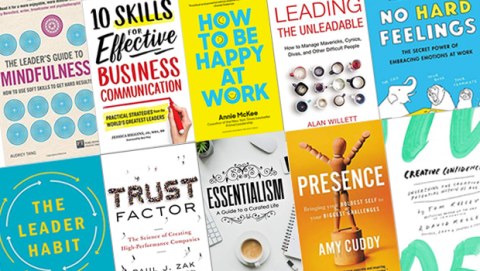People will sometimes name soft skills as that “X-factor” or certain quality that makes a great leader. These leaders can tell a story that inspires and motivates teams to bring their best to an initiative. These leaders know how to listen and provide honest, empathetic feedback - so people open up about work issues. Simply put, these leaders inspire people to trust.
As Anders Wallgren, CTO at Electric Cloud, told us, “It's funny that we even talk about these skills as ‘soft,’ because they are very hard to master and are frequently the cause of more trouble than lack of ‘hard’ skills.”
However, any leader can improve these skills with practice – and many successful leaders look at soft skills and emotional intelligence as areas that call for continuous learning.
[ Are you known as having high or low EQ? See our related story, 10 things leaders with emotional intelligence never do. ]
Whether you want to hone your communication skills, get better at problem-solving, or need help dealing with difficult coworkers, there’s a book on this list for you. Let’s dig in.
Presence: Bringing Your Boldest Self to Your Biggest Challenges
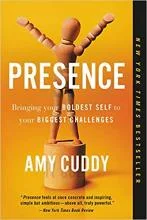
By: Amy Cuddy
Book description (via Amazon): “Amy Cuddy has galvanized tens of millions of viewers around the world with her TED talk about ‘power poses.’ Now she presents the enthralling science underlying these and many other fascinating body-mind effects, and teaches us how to use simple techniques to liberate ourselves from fear in high-pressure moments, perform at our best, and connect with and empower others to do the same. Brilliantly researched, impassioned, and accessible, ‘Presence’ is filled with stories of individuals who learned how to flourish during the stressful moments that once terrified them. Every reader will learn how to approach their biggest challenges with confidence instead of dread, and to leave them with satisfaction instead of regret.”
Why you should read it: Leaders must be able to communicate effectively, and they’d be remiss to overlook the nonverbal aspects of communication. You may feel confident in your words, but your body language may be telling a different story altogether. This book offers simple, practical tips and behavior tweaks that can help leaders tap into their own power to keep their cool in stressful situations.
Leading the Unleadable: How to Manage Mavericks, Cynics, Divas, and Other Difficult People
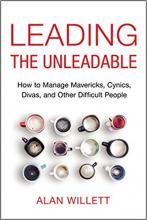
By: Alan Willett
Book description (via Amazon): “Written by an insider in the tech industry, where personality issues routinely wreck projects, the book reveals a core truth: most people actually want to contribute results, not cause headaches. Once you realize the potential for change, the book's simple steps, examples, and scripts explain how to right even the most hopeless situations. Every manager has ‘problem people.’ What sets great managers apart is how they turn them into productive team players. Prepare to transform the troublesome into the tremendous.”
Why you should read it: Leaders with great soft skills can work with anyone. That’s because they can easily adapt their leadership style to bring out the best in everyone – no matter how challenging the person may be. If you find that some personality types can easily push your buttons or that tense confrontations with difficult employees shake your confidence, this book can help.
Trust Factor: The Science of Creating High-Performance Companies
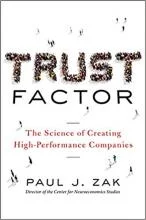
By: Paul Zak
Book description (via Amazon): “’Trust Factor’ opens a window on how brain chemicals affect behavior, why trust gets squashed, and ways to consciously stimulate it by celebrating effort, sharing information, promoting ownership, and more. The Ofactor(TM) survey, data, and examples support the action plans. Engagement programs and monetary rewards are Band-Aids on broken bones. To get to the root of the problem, you've got to go deeper. Packed with examples from The Container Store, Zappos, and Herman Miller, ‘Trust Factor’ harnesses our neurochemistry to effectively cultivate workplaces where trust, joy, and commitment compound naturally.”
Why you should read it: This book gets at the neuroscience behind why culture is so difficult for companies to improve. It all boils down to trust, says the author, and all the human behaviors and organizational dynamics that go along with it. For instance, there’s a right way and a wrong way for leaders to show recognition and reward employees – and figuring out the right way takes soft skills.
10 Skills for Effective Business Communication: Practical Strategies from the World's Greatest Leaders
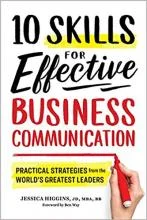
By: Jessica Higgins JD MBA BB
Book description (via Amazon): “From interview strategies to high-stakes negotiation tactics, ‘10 Skills for Effective Business Communication’ offers practical strategies to improve communication skills and help you succeed in your career. Equal parts research and actionable advice, this book applies effective strategies from the world’s most successful professionals to common workplace scenarios. With step-by-step guidance and simple exercises, you’ll learn why, how, and when to use fundamental communication skills to successfully navigate any situation.”
Why you should read it: Communication typically tops the list of important soft skills for leaders – and it’s one that nearly everyone can improve. You might be an amazing presenter but struggle with one-on-one conflict resolution, for instance. Higgins tackles both sides of communication – listening and speaking – to help leaders improve their skills, form better relationships, and advance their careers.
Essentialism: A Guide to a Curated Life

By: Gary Posner
Book description (via Amazon): “Mental health issues and employee burnout rates are on the rise, which causes us to ask, why is this happening? The definition of success in the West is synonymous with money and power, and we’ve learned that to achieve those things we must work hard, amass money, and spend that money on materialistic things. What if we could define success in our own terms? A new mindset called Essentialism could potentially change your life by increasing the value you put on your own health and wellbeing. When we choose to focus on the essentials, we able to increase our output, creativity, and happiness by removing those things from our lives that cause us pain and annoyance.”
Why you should read it: The best leaders bring their creativity, focus, and energy to work every day. That takes mental clarity, which is hard to get when you are drowning in tasks, meetings, and priorities. You might take the Marie Kondo approach and declutter your work life by learning how to say “no” and removing the small things in your day-to-day life that distract you from your goals. This book can help.



